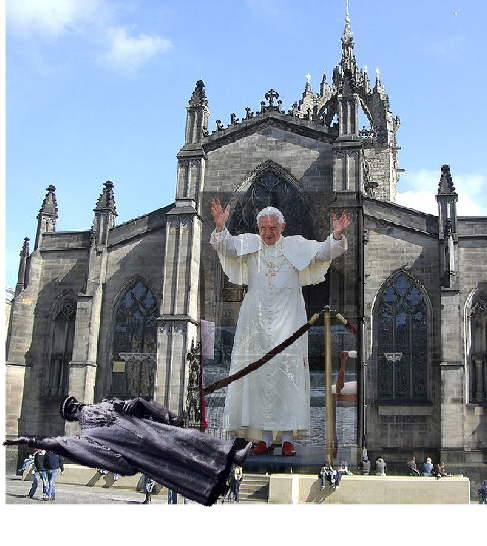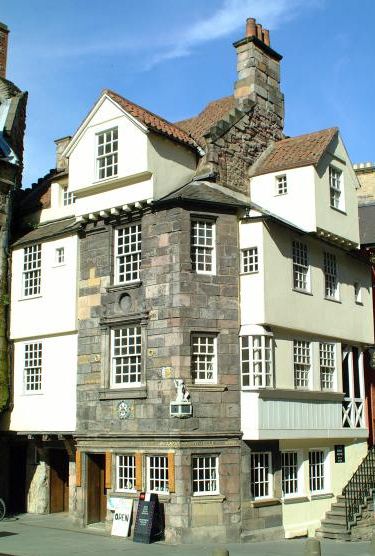The Reformation: they think it's all over; it is now
The Reformation has been cancelled – or so it would seem. Much to that community’s chagrin no doubt, the Stornoway-born and recent Church of Scotland Moderator Rev. Sheilagh Kesting has proclaimed a ‘first’ in terms of a post-Reformation pact with the Roman Catholic Church.
 THE 450th Anniversary of the Scottish Reformers’ break with the Vatican in 1560 is - in what may be considered a supreme affront to the Reformers' efforts to restore the church to biblical forms - to be commemorated in St. Giles’ Cathedral in Edinburgh on 3 November 2010. THE 450th Anniversary of the Scottish Reformers’ break with the Vatican in 1560 is - in what may be considered a supreme affront to the Reformers' efforts to restore the church to biblical forms - to be commemorated in St. Giles’ Cathedral in Edinburgh on 3 November 2010.
Rev. Sheilagh Kesting, the first female minister to be appointed as Moderator, described the unprecedented move as a symbol of the greater understanding and co-operation that now exists between the two churches.
It is not without significance that the Pope is due to visit Scotland this Autumn. He is scheduled to be received by the Queen at Holyrood in Edinburgh on 16 September and go on to conduct an open air Mass in Glasgow.
Meanwhile with regards to the St. Giles' service and speaking for the Roman Catholic Church in Scotland Peter Kearney, said: “This is a significant and seminal moment in Scottish Church history.” You bet; and for a variety of reasons.
This development will effectively scupper any hope whatsoever of the Church of Scotland being taken seriously by true Bible believers. It will also remove the prospect of any other presbyterian church in Scotland linking itself with the Kirk: not that there was much prospect of this anyway.
Those who are familiar with the history of the Reformation in 16th-century Britain will know that the impetus and dynamic in Scotland and England were markedly different.
South of the border, King Henry VIII desired to throw off the Pope’s authority as head of the Church in order to divorce his first wife and marry Anne Boleyn. Henry then duly installed himself as head of the Church of England under the so-called Divine Right of Kings which freed him from any earthly authority: it was a ‘power grab’ for personal advantage and political gain.
However in Scotland things were much different. Whilst Scottish Reformers also wished to remove believers from the Pope’s overarching jurisdiction, the heart-felt desire of John Knox and his colleagues was to see Christ Jesus given His place as the head of His church. The thrust was to break free from the corrupt and stultifying influence of an aberrant religious institution with a mere human as its head.
St. Giles at the heart of city, the Reformation and Scotland
At centre stage was, and is, St. Giles’ Cathedral (the name is now an anachronism as there are no longer titular bishops in the presbyterian Kirk, and believers are no longer venerated in this way). The church is an iconic emblem of both the Church of Scotland and the post-Reformation nation: it stands at the heart of Scotland’s capital city in Edinburgh’s Royal Mile. The Cathedral houses a statue of Knox, and his house is located further down the street.
John Knox's house
 In 1559, during the violent upheavals surrounding the Reformation which aimed to destroy the ways of the Roman Catholic Church, soldiers were stationed outside St. Giles. Protestant nobles pulled down some of the altars at the Cathedral and the Roman Catholic Mass was scrapped. A few months later, and following a failed invasion by France, St. Giles was completely stripped of all ornamentation: the entire interior was whitewashed. Subsequently Knox, who hated the abuses of Catholic Church of that day, was made pastor of the famous building. In 1559, during the violent upheavals surrounding the Reformation which aimed to destroy the ways of the Roman Catholic Church, soldiers were stationed outside St. Giles. Protestant nobles pulled down some of the altars at the Cathedral and the Roman Catholic Mass was scrapped. A few months later, and following a failed invasion by France, St. Giles was completely stripped of all ornamentation: the entire interior was whitewashed. Subsequently Knox, who hated the abuses of Catholic Church of that day, was made pastor of the famous building.
In the following century, ‘Reformation’ trouble broke out again when the English King Charles I, attempted to force the English Episcopal form of church government and prayer book upon the Scots. In an attempt to replace Knox’s much-loved ‘Book of Common Order’ with the English liturgy, the King’s appointee Bishop Lindsay experienced a people’s revolt when a certain Jenny Geddes reputedly picked up the stool on which she was seated and threw it at the Dean sitting just below the pulpit declaring: “Traitor! Dost thou say Mass at my lug?” (Traitor! Do you say the [Roman Catholic] Mass in my ear).
Following the lady’s example, others set their stools flying and the service had to be abandoned: such was the strength of feeling in a newly-reformed Scotland at that time. True Christians, it was believed, submitted themselves to Christ and the Reformed church. A continued allegiance to Rome represented a submission to a corrupt and heretical Roman Catholicism and a Christ-usurping Pope. Of the latter, the Protestant Westminster Confession of Faith – written in 1646 and still the ‘subordinate standard’ of the Presbyterian churches – states: ‘There is no other head of the Church but the Lord Jesus Christ: nor can the Pope of Rome in any sense be head thereof; but is that Antichrist, that man of sin and son of perdition, that exalteth himself in the Church against Christ, and all that is called God’ (WCF XXV; vi).
A good question: then an now
However moving on through history to the 20th century, the late Captain Stephen Anderson, a highly-respected Kirk elder, lay preacher and evangelist-at-large was once asked the question: “Do you believe there are true Christians in the Roman Catholic Church?”
Subsequently, and certainly since last year’s disastrous acceptance by the General Assembly of an openly-gay minister, the same question could be posed now with respect to the Church of Scotland. If Captain Anderson were around today he could understandably be asked: “Do you believe there are true Christians within the Church of Scotland?” And his reply could well repeat the one he gave these years ago in relation to the Roman Catholic Church: “Yes, I believe that there are; but God knows how they stay within it?” What can surely be said is that those many fine Christians within the Kirk are effectively in a battle and a mission field within the organisation.
So set against the backdrop of gay clergy, the Church of Scotland’s planned air-brushing of the reasons for the ancient split with Rome, and the celebration of a new ‘enlightened’ unity will much increase the angst amongst born-again clergy, elders and members within the national church.
So within a Scotland which is desperately needing authoritative and biblical spiritual leadership we have seen one Protestant denomination tied up over what to sing to what accompaniment, whilst another throws out biblical injunctions on sexuality and now embraces that which it once most emphatically rejected.
Choose Christ
“Religion”, someone once observed, “is a portrait of God painted by the devil.” It’s a good description. The great encouragement in all of this is that amongst the rubble of denominational churchianity, man’s failures give God great opportunity. The prophet Zechariah declared an eternal truth: "This is the word of the Lord to Zerubbabel: 'Not by might nor by power, but by my Spirit,' says the LORD Almighty.”
Pray that the spirit expressed by a leading churchman of an earlier age will find a resonance within the minds of his successors: “Who cares for about [his denomination] compared with the Christian good of the people of Scotland? Be assured that the moral and religious well-being of the population is of infinitely higher importance than the advancement of any sect.”
Pray also that believers within the national church – both in pulpit and in pew – will be strengthened in maintaining a sound biblical position within the Kirk.
Meanwhile we can remind the arch-enemy of God’s declared purposes that Christ’s coming has assured his defeat, and in Jesus the victory is won. Of the Saviour of the world the Bible assures us: “the one who trusts in him will never be put to shame” (Is 28:16; Rom 9:33).
Footnotes:
1. Amidst the current prospects of a rush to Rome in England and, as it now seems, in Scotland also the article 'But the Bible does not say so...' (published with permission from Sword magazine) outlines the key doctrines within Roman Catholicism that the Reformers rejected and any true Reformed church still does.
2. The Church of Scotland prides itself as being a 'broad church'. In fact it is so broad that the bookshop in St. Giles sells literature on the New Age, neo-paganism, earth-worship and other spiritualities. See article on Pre-election Snapshot.
3. For a resumé of the Reformation events during the summer of 1560AD in Scotland see:
Scotland 1560: quite a summer so far
|